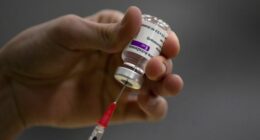Share this @internewscast.com

The tea can lower inflammation caused by liver diseases, which can go on to potentially cause liver cancer (Image: Getty)
Research has indicated that inflammation and unhealthy ageing can lead to the development of non-viral liver cancer. However, scientists have now found that consuming a certain type of tea could ‘reverse’ some of these ‘dysregulation pathways’, thereby reducing your risk of developing liver cancer.
Liver cancer can unexpectedly arise from normal liver tissue. Recent studies, however, have highlighted an increasing connection between specific liver cancers and non-viral chronic liver disease (CLD). Specialists have identified that one particular form of liver cancer, known as hepatocellular carcinoma (HCC), is associated with CLD in 15-25% of instances.
The escalating cases of chronic liver disease (CLD) in conjunction with hepatocellular carcinoma (HCC) suggest that this condition may render liver tissue more prone to cancer. To investigate the differences between healthy liver tissue and that of HCC patients suffering from CLD, researchers from Hiroshima University, Hiroshima Prefectural Hospital, and Hiroshima University Hospital launched a study, reports Surrey Live.
“In this study, we analysed non-cancerous liver tissue adjacent to HCC lesions from patients with non-viral chronic liver disease. Through multi-omics analysis of transcriptomic and metabolomic data, we aimed to uncover molecular mechanisms underlying HCC development and identify novel targets for chemoprevention,” Hikaru Nakahara, a graduate student at Hiroshima University’s Graduate School of Biomedical and Health Sciences in Japan and lead author of the study, explains.
“The molecular mechanisms underlying the development of HCC from CLD have been shown to involve activation of inflammation-related signals and age-related metabolic abnormalities. It is suggested that there is a need to distinguish targets for chemoprevention based on these different mechanisms,” added Atsushi Ono, Hiroshima University lecturer and co-author of the study.
The expert further noted: “In addition, it has been suggested that supplementation with antioxidants, such as epigallocatechin gallate (EGCG), may be effective in ameliorating these abnormalities.” The researchers hold that dysregulated pathways like inflammation and unhealthy ageing, which are causal factors in CLD, could be key targets in the prevention of HCC.

Some research suggests that green tea may help protect against liver cancer (Image: Getty)
Researchers have been examining the potential of green tea to ‘reverse’ inflammation and promote healthy ageing, both of which can significantly lower the risk of chronic liver disease (CLD), a condition linked to Hepatocellular Carcinoma (HCC). A previous study using a high-fat diet-induced non-alcoholic fatty liver mouse model demonstrated that green tea could prevent inflammation.
The scientists suggest that green tea might help reverse some of the pathway dysregulation that can occur from CLD, which can lead to HCC. Other research has indicated that green tea can decrease levels of liver enzymes like ALT and AST, markers of liver damage.
The catechins found in green tea extract could help alleviate inflammation caused by liver diseases such as nonalcoholic fatty liver disease (NAFLD). Green tea may also aid in regulating lipid metabolism, potentially reducing the build-up of lipids in the liver. Separate studies propose that green tea could offer protection against liver cancer.
A 2017 study analysing the health of individuals who consumed green tea and those who did not, discovered a significant reduction in liver cancer only in the group with the highest green tea consumption. Another study’s results showed that drinking one cup of green tea daily was associated with a 4% reduced risk of liver cancer.
Researchers have pinpointed a powerful component in green tea, a catechin called epigallocatechin-3-gallate (EGCG), which boasts antioxidant properties that could shield cells from free radical damage often tied to inflammation and long-lasting inflammation.
Hiroshima University’s team have said, though, that further studies are needed to confirm treatments that prevent HCC, with predictions aimed at crafting bespoke therapies.
“In the future, we hope that treatments will be developed that are tailored to molecular abnormalities, such as eliminating inflammation in the [CLD] group characterised by inflammation, and replenishing [metabolites] that become deficient with age in the [CLD] group characterised by ageing,” researcher Ono said.
Cancer Research UK issued caution on the green tea cancer connection: “There is no real evidence that green tea can help treat cancer. There is some evidence from early studies to suggest that having green tea might reduce the risk of some cancers. But at the moment, the evidence is not strong enough to know this for sure.”
While drinking green tea is largely safe for most, high concentrations through supplements bear potential risks to liver health, with susceptibilities varying amongst individuals even at modest consumption levels.

Green tea may reverse some of the pathway dysregulation that can contribute to cancer (Image: Getty)
Green tea, while beneficial, contains caffeine and theanine. High doses of EGCG, found in green tea, can cause nausea and stomach discomfort for some people, and excessive amounts can be detrimental to liver health, potentially altering liver enzyme levels. It’s important to note that green tea can interact with certain medications, so it’s essential to seek medical advice before consuming it, especially if you’re on medication.
What is liver cancer?
Liver cancer is a form of cancer that can develop anywhere within the liver, a large organ situated in the upper right section of your abdomen. The liver plays a vital role in digesting food and filtering out toxins.
This type of cancer can either start in the liver (primary) or spread from another part of the body (secondary). The severity of liver cancer depends on its location within the liver, its size, whether it has spread, whether it is primary or secondary, and your overall health.
In the UK, it’s estimated that about two million people suffer from chronic liver disease, including more than 600,000 who have severe liver conditions. One in three people in the UK may also be at risk of developing liver disease.
How can you prevent liver cancer?
To significantly reduce your risk of developing liver cancer, it’s crucial to protect your liver through healthy lifestyle and dietary choices. This includes reducing alcohol consumption, maintaining a healthy weight, eating a balanced diet, ensuring adequate sleep, quitting smoking, regular exercise, getting vaccinated against hepatitis B, and managing hepatitis C effectively if you have it.
Although no food or drink can completely prevent cancer, consuming a balanced diet full of fruits, vegetables, and whole grains can lower your risk. Some foods and drinks, such as coffee, cruciferous vegetables, fish (especially oily fish), and garlic may offer additional health benefits.
Our community members are treated to special offers, promotions, and adverts from us and our partners. You can check out at any time. Read our Privacy Policy
Symptoms of liver cancer:
In many cases, liver cancer can go undetected, but when signs do appear, they can be subtle. Both primary and secondary liver cancer exhibit the same symptoms.
Common symptoms include:
- the whites of your eyes turning yellow or your skin turning yellow, which may be less obvious on brown or black skin ( jaundice ) – you may also have itchy skin, darker pee and paler poo than usual
- loss of appetite or losing weight without trying to
- feeling tired or having no energy
- feeling generally unwell or having symptoms like flu
- a lump in the right side of your tummy
Liver cancer can also affect digestion, resulting in:
- feeling or being sick
- pain at the top right side of your tummy or in your right shoulder
- symptoms of indigestion, such as feeling full very quickly when eating
- a very swollen tummy that is not related to when you eat
The NHS advises: “Many of these symptoms are very common and can be caused by different conditions. Having them does not definitely mean you have liver cancer. But it’s important to get them checked by a GP. This is because if they’re caused by cancer, finding it early may mean it’s easier to treat.”
Reversing liver cancer:
The NHS states: “If you have advanced liver cancer, it might be very hard to treat. It may not be possible to cure the cancer. If this is the case, the aim of your treatment will be to limit the cancer and its symptoms, and help you live longer. Finding out the cancer cannot be cured can be very hard news to take in.”
While a complete cure for liver cancer can be difficult, particularly in advanced stages, effective treatments can significantly influence the disease’s progression. The best odds are when liver cancer is detected early and treated promptly. Early detection and appropriate treatment choices may result in long-term remission or even a cure for some individuals.

Green tea may offer protective effects against certain liver diseases (Image: Getty)
What are the options for treatment?
In advanced stages, the focus shifts to easing symptoms, slowing the disease’s progression, and improving overall well-being. The liver has an incredible ability to self-repair and regenerate, which can aid recovery following certain treatments and procedures.
However, severe damage, such as that caused by advanced cancer or other diseases, may prevent the liver from repairing itself. While full remission isn’t always achievable with current treatments, long-term remission, where there is no recurrence for a prolonged period, is possible with the right treatment and patient care.
What if you’ve been told your cancer cannot be cured?
The NHS says: “If you have advanced liver cancer it might be very hard to treat. It may not be possible to cure the cancer. If this is the case, the aim of your treatment will be to limit the cancer and its symptoms, and help you live longer. Finding out the cancer cannot be cured can be very hard news to take in.”
You will be directed to a dedicated team of medical professionals, known as the palliative care team or symptom control team. Their role is to assist you in managing your symptoms and enhancing your comfort. The clinical nurse specialist or palliative care team can also provide support for you and your loved ones as needed.

















